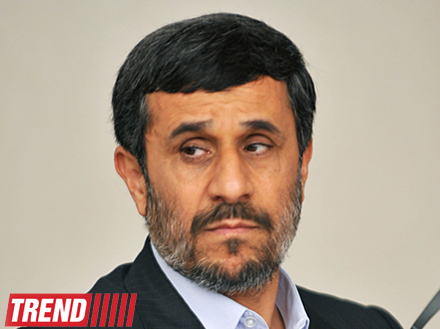Iranian President Mahmoud Ahmadinejad said Tuesday that a new world order needs to emerge, away from years of what he called American bullying and domination, AP reported.
Ahmadinejad spoke to The Associated Press in a wide-ranging interview on the sidelines of the U.N. General Assembly - his last as president of Iran. He was to address the assembly Wednesday morning.
The Iranian leader also discussed solutions for the Syrian civil war, dismissed the question of Iran's nuclear ambition and claimed that despite Western sanctions his country is better off than it was when he took office in 2005.
"God willing, a new order will come together and we'll do away with everything that distances us," Ahmadinejad said, speaking through a translator. "I do believe the system of empires has reached the end of the road. The world can no longer see an emperor commanding it."
"Now even elementary school kids throughout the world have understood that the United States government is following an international policy of bullying," he said.
President Barack Obama warned Iran earlier Tuesday that time is running out to resolve the dispute over its nuclear program. In a speech to the General Assembly, Obama said the United States could not tolerate an Iran with atomic weapons.
Ahmadinejad would not respond directly to the president's remarks, saying he did not want to influence the U.S. presidential election in November.
But he argued that the international outcry over Iran's nuclear enrichment program was just an excuse by the West to dominate his country. He claimed that the United States has never accepted Iran's choice of government after the 1979 Islamic revolution.
"Everyone is aware the nuclear issue is the imposition of the will of the United States," he said. "I see the nuclear issue as a non-issue. It has become a form of one-upmanship."
Ahmadinejad said he favored more dialogue, even though negotiations with world powers remain stalled after three rounds of high-level meetings since April.
He said some world leaders have suggested to him that Iran would be better off holding nuclear talks only with the United States.
"Of course I am not dismissing such talks," he said, asked if he were open to discussions with the winner of the American presidential election.
Israeli leaders, however, are still openly contemplating military action again Iranian nuclear facilities, dismissing diplomacy as a dead end. Israel and many in the West suspect that Iran is seeking to acquire nuclear weapons, and cite its failure to cooperate fully with nuclear inspectors. Iran says its nuclear program is for peaceful purposes only.
Ahmadinejad also proposed forming a new group of 10 or 11 countries to work to end the 18-month Syrian civil war. Representatives of the nations in the Middle East and elsewhere would meet in New York "very soon," he said.
Ahmadinejad will leave office next June after serving two four-year terms. He threw out numbers and statistics during the interview to show that Iran's economy and the lives of average Iranians have improved under his watch.
Since his 2005 election, he claimed, Iran went from being the world's 22nd-largest economy to the 17th-largest; non-petroleum related exports increased sevenfold; and the basic production of goods has doubled. Median income increased by $4,000, he said.
"Today's conditions in Iran are completely different to where they were seven years ago in the economy, in technical achievement, in scientific know-how," Ahmadinejad said. "All of these achievements, though, have been reached under conditions in which we were brought under heavy sanctions."
Iran has called for the U.S. and its European allies to ease the sanctions that have hit its critical oil exports and left it blackballed from key international banking networks.
Edited by: S. Isayev






